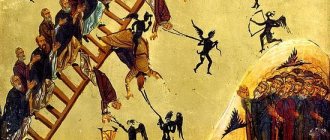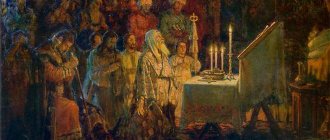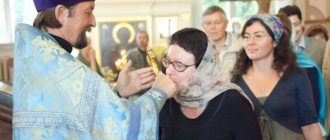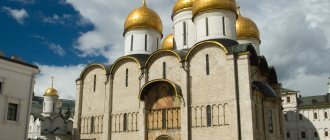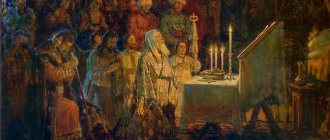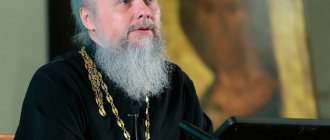Uminsky Alexey Anatolievich
1960
publicist of modernist and liberal trends, immoral teacher
Russian Orthodox Church
Third generation of modernists
San: archpriest
Graduated from: Moscow State Regional University, MDS
Taught at: St. Vladimir's Training Center, Public Orthodox Youth Lecture Hall, Diocesan Missionary Courses in Moscow
Organizations: Moscow Charitable Brotherhood of St. Equal-to-the-Apostles Prince Vladimir, Synodal Department of Religious Education and Catechesis
Press: Alpha and Omega (magazine), Epiphany (magazine), Journal of the Moscow Patriarchate, Everyday Affairs (TV program), Orthodox Encyclopedia (TV program), Orthodoxy and the World (Internet portal), Danilov Monastery (publishing house), Nicaea (publishing house) , Satis (publishing house), St. Vladimir Brotherhood (publishing house), Sisterhood in the name of St. Ignatius of Stavropol, Neophyte Studio, Neskuchny Garden (magazine)
Direction: liturgical renewal movement
,
negative Christianity
,
liberalism
Modernism
(1960) - modernist and liberal publicist, immoral teacher.
education
In 1982 he graduated from the Faculty of Romance-Germanic languages of the Moscow Regional Pedagogical Institute. Krupskaya (MOPI). For 8 years he worked as a French teacher in a secondary school.
In 1993-2002 - director of the St. Vladimir Educational Center (the founder of the center is the Moscow Charitable Brotherhood of St. Equal-to-the-Apostles Prince Vladimir). Then - the confessor of this gymnasium and teacher of the Law of God. Teaches “Introduction to Asceticism” at catechist courses in the name of the Church. Thaddeus, Archbishop of Tver.
In 2004 he graduated from the Moscow Theological Seminary.
He spoke at the Public Orthodox Lecture in 2009-2010. The lecture hall is a project of the Center for the Spiritual Development of Children and Youth.
Sermons
In them, the priest addresses the most pressing topics of our time. It should be noted that he does not particularly spare his interlocutors. It is especially harsh towards those who expect only gifts from the church: health, happiness and all the best in this life. Alexey Uminsky, a priest, appears as such a strict and at the same time loving priest.
Reviews about him demonstrate that he takes a fairly active social position: he gives sermons and lectures for various audiences, answers the most difficult and sometimes provocative questions.
One of the topics discussed is the situation in Ukraine. And the church is expected to take one of the sides. But this is impossible, because there are children on both sides. Therefore, Orthodox Christians of both countries, who have taken an irreconcilable position, pray and ask the Lord for peace.
hierarchy
On May 27, 1990, he was ordained a deacon, and on September 9, 1990, a presbyter.
The service took place in the Church of the Icon of the Mother of God “Joy of All Who Sorrow” (Klin, Moscow region).
Since the end of 1990, rector of the Assumption Cathedral in Kashira, dean of churches in the Kashira district of the Moscow diocese. Three years later he transferred to Moscow and became a cleric of the Church of St. Prince Vladimir.
Since 1994, rector of the Church of the Life-Giving Trinity in Khokhly.
In 2002 he was elevated to the rank of archpriest.
Orthodox psychology fights various manias, rehabilitates addicts
One of the central topics of Alexey Moroz’s research is drunkenness. Side by side with it goes another thing - drug addiction. If desired, other manias can be considered in this context:
- Gambling addiction;
- Computer mania;
- Internetmania.
One of Alexei Moroz’s books about the struggle of Orthodoxy with addictions.
All these are forms of addiction, and the task of Orthodox psychology is to help a person overcome them. Alexey Moroz himself spoke in an interview about his views on addiction:
Alexy Moroz
Priest
“We believe that drug disease is drug obsession. First of all, spiritual damage occurs, then it moves into the psyche, and then the disease manifests itself at the physical level. Therefore, first of all, drug addicts are people possessed by a demon. This is 100 percent.
Drug addiction is a passion, and any passion, as shown by the Holy Fathers, is the result of targeted mental influence, and such people are, to one degree or another, obsessed. Therefore, it is possible to overcome drug addiction only with the help of God.
A person gives up all his sins, renounces his sins, repents of them and begins to observe all the commandments of God. Because God’s commandments are the law of spiritual life.”
Completely free of charge, specialists work with addicted people for nine months:
- Some teach spiritual life, conduct Orthodox rituals, help find strength to overcome addiction;
- Others are engaged in psychological rehabilitation of patients, conduct physical therapy, and monitor the general health of the patient.
liturgical reform
In the Church of the Life-Giving Trinity in Khokhly, Fr. carried out modernist reforms of worship in the spirit of “liturgical revival”. Alexander Shmeman.
At the call of Fr. A. Uminsky, parishioners receive communion at every Liturgy: “Very many of our parishioners receive communion at every Sunday liturgy, some receive communion at every liturgy.”
Eucharistic secret prayers are read publicly: “We don’t have very good acoustics and that’s why we put microphones on the choir and, accordingly, in the altar. Therefore, the Eucharistic prayer, which I read aloud, is available to all parishioners to hear.”
Mandatory confession before Communion has been abolished. Confession, according to Fr. A. Uminsky - a tool for communicating with parishioners: “a wonderful opportunity when a priest can communicate with his parishioners on spiritual topics, including using such a tool as confession.”
O. A. Uminsky, with his authority, abolished the fast before Communion: “We have more fasting days in our calendar than non-fasting ones. It seems to me that there is no need to burden people who come to communion with other things, even meat on Saturday, for example.”
In general o. A. Uminsky is not satisfied with the fact that in the Orthodox Church there are “a lot of unreasonable obstacles to receiving communion.” He explains the statutes and customs that have developed in the Russian Church by the self-interest of the hierarchy and clergy, since the Sacraments of Baptism and weddings “bring real material income. But communion does not bring material income.”
Equality and brotherhood
At the same time, o.A.U. disclaims responsibility for the results of his liberal preaching: I encourage all our parishioners to receive communion at every liturgy, but no one is required to receive communion at every liturgy.
O.A.U. boldly introduces liberal ideas of equality and brotherhood into the Church: In the world of the Church, everyone is a priest. The first sacred degree to which a person is initiated during baptism and confirmation is that of a layman, and every Orthodox Christian belongs to it.
On June 3, 2011, he took part in the presentation of the scandalous book by Yu.S. Belanovsky and A.V. Bozhenova “Two into one flesh: love, sex and religion.” The book was published by the Eksmo publishing house and was advertised as the first frank book about the intimate lives of believers, which is fully consistent with its obscene cover. The book was not accepted by the Publishing Council of the Moscow Patriarchate because they considered that it might confuse “another pious reader.
press
Since 1996, he has been a member of the editorial board of the modernist magazine Alpha and Omega. In the 90s, he was a member of the editorial board of the information and educational magazine “Enlightenment” (an anti-sectarian supplement to the “Journal of the Moscow Patriarchate”).
He hosted the program “Everyday Affairs” on the “Culture” channel, and then the “religious” series “Narrow Gates”. Since October 2003, he has been the host of the “Orthodox Encyclopedia” program (TVC channel).
Participant in the round table “on preparation for Communion” on December 27, 2006 at the Center for the Spiritual Development of Children and Youth at the Danilov Monastery (headed by Father Peter (Meshcherinov)), where he spoke out against the obligation of confession before Communion. In his report, Fr. A. Uminsky improvised based on the works of Fr. A. Schmemann: “For people who are already firmly on their feet, confession can truly be “with the blessing of the priest” and not be strictly connected with the Eucharist, which is what has developed in our parish practice.”
Father Alexy Uminsky worked as a TV presenter and still participates in Christian television projects
Father Alexy spends a lot of time working on numerous television projects. At the same time, he acts not only as a participant in various discussions or a lecturer. He was a regular presenter of three Orthodox programs.
At first there was a program on the “Culture” TV channel called “Everyday Affairs.” Later, a series about the lives of saints, “The Narrow Gate,” appeared on television.
In this studio, Father Alexy is not a guest, but a full-fledged owner and presenter. A large selection of sermons and television programs from Fr. Alexy Uminsky can be found on the website “Orthodoxy and Peace”
Sermons by Alexei Usminsky on the website “Orthodoxy and Peace”
Today he is the host of the television project “Orthodox Encyclopedia”. The program talks about the basics of Orthodox life.
In these programs, famous cultural figures, historians, writers and representatives of the clergy examine and discuss topics related to Orthodoxy.
Each episode of the program covers the events of the Patriarchal ministry and reports on the most important news and events in the life of the Orthodox Church. The topics of such programs are always vital and any viewer will receive answers to their questions.
policy
During my school years I was a very active Komsomol member: “Apparently some organizational skills were discovered, I advanced along the Komsomol line, was the chairman of the Komsomol headquarters of the Perovsky district, and even had awards from the Central Committee of the Komsomol.”
A representative of liberal politics, participation in which he considers obligatory for the Church.
In December 2010, he signed a letter in support of M. Khodorkovsky, where the trial of the oligarch is called “a trial that brought indelible shame to the domestic judicial and law enforcement systems”[1].
In December 2010, he accused the Church of silence on political issues: “It seems to me that now has come a very active period in the life of the church, when it is obliged to intervene, is obliged to raise its voice, is obliged to demand from the state specific decisions on various issues... Of course, it is beneficial for the state a silent church that only builds churches, opens parishes, that is engaged only in quiet charity and grassroots mission. This is all very nice and pleasant, because it does not affect politics, the economy, or anything.”
O. Alexy Uminsky admits: “It’s time for us to express our positions. There is nothing political, demonstrative, or anything in this that could confuse our souls.” But the fact of the matter is that this act, as Fr. describes it. A.U.: “to influence politics and the economy” will be political in essence. It is not in the power of the Church to change the meaning of concepts and call the political non-political.
For Fr. A. Uminsky, the Church’s intervention in politics is its religious duty. He explains: “The Church still extends its mission to all humanity. And in Russia, our Local Church extends to our entire country. We must try to bring all our people to Christ... Many people have the impression that the church is not for them, but for some other people - crazy, unhappy, that is, the church is a society of other people. They and the church are completely different worlds. It is important that these people today understand and hear that each of them is dear and needed by the church, and in difficult times the church extends its hand to each of them without asking whether you will become a believer or not.”
According to this teaching, worldly care for non-believers is declared a religious duty, since the Church extends not only to believers, but to “the whole world,” “all people.” The church and secular mass society no longer belong to different worlds, and Christians are people just like everyone else.
Thus, o.A.U. deprives the activities of the Church of religious content. For him, as he writes, it does not matter whether a person becomes a believer or not: “The church extends its hand to everyone in difficult times without asking whether you will become a believer or not.” This looks like a paradox, but this is precisely the absurd and contradictory logic of the political view of the world. To influence the world around us, one must participate in politics, and by participating in Gnostic politics, a Christian dissolves in a social monolith, within which nothing can be done except through the adoption of Gnostic views and renunciation of the religious essence of man.
In 2022, he signed the “Open Letter from Priests in Defense of Prisoners in the Moscow Case”[2].
In 2022, he signed the “Letter of priests and laity to Christians of Belarus.”
Contraception
O.A.U. sees the solution to the “problem” of having many children in contraception, and believes that the Church should not interfere in this issue in any way, but accept the “choice” of the spouses:
To the question: If a couple is forced to plan the number of children, does the Church condemn this or not? - he answers: This question cannot be resolved so unambiguously - yes or no, condemns - does not condemn. The Church condemns sin. The Church does not condemn a person. The Church calls man to salvation; the Church loves man above all. She sympathizes with him and has compassion. But today many families plan the number of children based on purely practical, selfish considerations... In this case, such family planning, such a reluctance to have many children, is probably wrong. I won't say it's a sin. This may be a big mistake, which will not bring joy in the end to either the parents or the creature itself, which will become an adult, and will not help him become a person to the end.
O.A.U. argues that contraception is acceptable when parents are simply unable to truly support their family due to the fact that there is nowhere to live, nothing to eat, and no work. And then, probably, it is justified for some time when parents postpone the birth of their child to another date.
He contrasts wedding and Communion in an amazing way: The nature of marriage is the same always and everywhere, whether he is married or not... a Christian marriage receives the power of grace not so much from the fact that it is married by a priest in the church, but from the fact that people live together according to the Gospel and partake of the Body and the Blood of Christ.
O.A.U. does not make a distinction between the love of Divine and the love of fallen nature: The priest must make every effort to ensure that people who are looking for each other, first of all, set as their goal to love truly, to preserve this love, to increase this love and ultimately make it that royal love that leads people to salvation.
He systematically relates words about God’s love to human relationships: Love, as a property of God, is eternal. When I talk about love in marriage, I always remember the words of Holy Scripture from the book “Song of Songs” by Solomon, which says: “Love is as strong as death.” The New Testament, the Gospel tells us even more: “Love is stronger than death.”
views
The thought of O. A. Uminsky revolves around the ideologies generated by Fr. A. Schmemann and Met. Anthony of Sourozh. So, in the spirit of Met. Antonia O. A. Uminsky teaches about meeting the Man Christ, and not with Christ as God. Such a meeting is declared to be the essence of Christianity and what distinguishes it from other religions. Moreover, Fr. A. Uminsky accuses those who profess faith in Christ as God of ecumenism: “We see a completely different God - invisible, incomprehensible, omnipotent, omnipresent, eternal. And it is impossible to love someone who is incomprehensible... if these principles are taken as a basis, sooner or later it will turn out that in general there is no fundamental difference between Islam, Christianity, Judaism and many other religious systems.”
A supporter of mystical collectivism, which was expressed in his liturgical reforms at the parish. He teaches: “Man was created as a communal being. The family is an expression of man’s conciliarity, his inner anthropologically embedded churchliness. In family life it is possible to realize the God-given fulfillment of the Church as such. And this is very important, this is a serious spiritual ascetic path of the feat of building oneself in the image and likeness of God.”
Aggressive proponent of secularization: “I am often worried about the fearful, hostile attitude of children towards the world, towards everything that surrounds us. The world in which we live seems to us fallen, sinful, possessed by demonic malice, and it really is like that. But gradually an opinion is emerging that if the world is coming to an end, then we need to be hostile and afraid of it.”
According to the fantastic theory of Fr. A. Uminsky, only the Old Testament Church, enslaved to the weak and poor material principles, was hostile to the world. And the Christian Church of the New Testament, the Kingdom is not of this world, according to Fr. A. Uminsky, “it is not hostile to the world. This is what distinguishes the New Testament Church from the Old Testament. The world is at war with God and the Church, and our task is to respond to it not with hostility in the spirit of the Old Testament (“an eye for an eye, a tooth for a tooth”), but with peace and prayer for it.”
O. A. Uminsky develops modernist ideas about experimental knowledge of God, which he combines with amoralism, adogmatism and irrationalism in general: “To know God in Christianity does not mean reading some books about God, learning some dogmas; this means communion with Him. This is the same as how a person recognizes a person, uniting with him in love, in family life, in friendship, when a person opens up to another person, when these people become close to each other, family, united.”
He opposes the dogma about the Church: “According to the catechism of St. Philaret of Moscow, the Church is a society of believers united by a single faith and common rituals. This can be said about any religious association, about Muslims, Jews, about anyone.”
O. A. Uminsky systematically opposes norms and commandments: “Our religious life, our Orthodoxy, unfortunately, is often built on the basis of what is “possible” and what is “not allowed,” but this has nothing to do with life in God , although it often becomes the dominant feature of a Christian’s life. Our children develop this idea of Christianity - when almost nothing is allowed. This scheme comes instead of spiritual life, instead of love, instead of a living relationship between man and God.”
O. A. Uminsky even provides a “pedagogical” justification for this: “Our system of prohibitions, although very clear, is not the fundamental principle of education. It is a kind of safety net. For example, we don’t have such a principle of “not watching TV”... Children still break prohibitions anyway. They have their own system of aesthetic values; they have not yet matured to our system. Teachers should at least know what our children are doing and what they like.”
At the same time, Fr. A. Uminsky disclaims responsibility for the results of his liberal sermon: “I encourage all our parishioners to receive communion at every liturgy, but no one is required to receive communion at every liturgy.”
O. A. Uminsky boldly introduces liberal ideas of equality and brotherhood into the Church: “In the world of the Church, everyone is a priest. The first sacred degree to which a person is initiated during baptism and confirmation is that of a layman, and every Orthodox Christian belongs to it.”
On June 3, 2011, he took part in the presentation of the book by Yu.S. Belanovsky and A.V. Bozhenova “Two into one flesh: love, sex and religion.” The book was advertised as “the first candid book about the intimate lives of believers,” as its raunchy cover certainly matches. The book was not accepted by the Publishing Council of the Moscow Patriarchate because they considered that it “might confuse some pious readers.”
O. A. Uminsky has long and boldly opposed the Orthodox teaching on marriage. “Here I recently read (Saint) Fr. Alexey Mechev. He wrote: “The purpose of the Christian family is procreation.” But this is obviously wrong. Now it has become a cliche that is not discussed.” Later Fr. A. Uminsky developed the same idea: “After all, this is a completely poor understanding of a phrase taken out of the context of Holy Scripture. It simply cannot be interpreted and read in the sense that a woman needs to be exclusively a reproductive machine and that is supposedly her main merit before God. Otherwise, for us, the ideal of a Christian family should be a Muslim family or people of the Mumba-Yumba tribe. They are the ones who live by the principle: the more children there are, the more likely it is that at least some of them will not die, will remain alive and, as a result, the family will continue.”
Mohammedan organizations protested against the comparison of the Mohammedan family with the family of the Mumbo-jumba tribe ("Mumbo-jumbo tribe" is a contemptuous name for African tribes. See Mumbo jumbo).
O. A. Uminsky immediately made a public apology in a letter to the Mohammedan website IslamNews: “I regret that my phrase unwittingly caused some misunderstanding, and I am ready to apologize if it could offend someone. Of course, I in no way wanted to offend anyone... I really like the large number of children of Muslims. And in this sense, I think that Muslim families with many children sometimes give Christian families an example to follow.” According to him, he did not intend to compare “Muslim families with the families of some traditional tribe.” It is remarkable in its way that Fr. A. Uminsky did not apologize to the Orthodox Church, which he accused of Mohammedan or savage teaching on marriage.
According to the new teaching of Fr. A. Uminsky about marriage, “not many can accommodate the call: “reproduce and reproduce children,” expressed in the Divine command “Be fruitful and multiply” (Gen. 1:28). “Families are not rubber, people are not endless. Everyone has their own resource, everyone can do exactly what they can... Everyone can do it according to their strength. This issue cannot be regulated either by the clergy leadership or by any council decisions.”
This does not interfere with Fr. A. Uminsky to give instructions to the Church. Thus, he teaches, contrary to the teaching of the Church: “I am convinced that intimate relationships are a matter of personal internal freedom of each family, which is free in how to build their life.”
O. A. Uminsky sees the solution to the “problem” of having many children in contraception, and believes that the Church should not interfere in this issue in any way, but accept the “choice” of the spouses:
To the question: “If a couple is forced to plan the number of children, does the Church condemn this or not?” - he answers: “This question cannot be resolved so unambiguously - yes or no, condemns - does not condemn. The Church condemns sin. The Church does not condemn a person. The Church calls man to salvation; the Church loves man above all. She sympathizes with him and has compassion. But today many families plan the number of children based on purely practical, selfish considerations... In this case, such family planning, such a reluctance to have many children, is probably wrong. I won't say it's a sin. This could be a big mistake, which in the end will not bring joy to either the parents or this creature itself, which will become an adult, and will not help him become a person to the end.”
O. A. Uminsky argues that contraception is acceptable “when parents are simply not able to truly support the family due to the fact that there is nowhere to live, nothing to eat, no work. And then, probably, it is justified for some time when parents postpone the birth of their child to another date.”
He contrasts wedding and Communion: “The nature of marriage is the same always and everywhere, whether married or not... a Christian marriage receives the power of grace not so much from the fact that it is married by a priest in the church, but from the fact that people live together according to the Gospel and partake of the Body and Blood of Christ."
O. A. Uminsky does not make a distinction between Divine love and the love of fallen nature: “The priest must make every effort to ensure that people who are looking for each other first of all set as their goal to love truly, to preserve this love, to increase this love and ultimately making it that royal love that leads people to salvation.”
He systematically relates words about God’s love to human relationships: “Love, as a property of God, is eternal. When I talk about love in marriage, I always remember the words of Holy Scripture from the book “Song of Songs” by Solomon, which says: “Love is as strong as death.” The New Testament, the Gospel tells us even more: “Love is stronger than death.”
authoritative authors
Amfilohiy (Radovich) • Justin (Popovich) • Kierkegaard Soren • Leskov Nikolai Semenovich • Solovyov Vladimir Sergeevich • Florensky Pavel Alexandrovich • Khomyakov Alexey Stepanovich • Eckhart Meister.
O. Uminsky Alexey Anatolyevich. Amoralism
O.A.U. develops modernist ideas about the experimental knowledge of God, which is combined with amoralism, adogmatism and irrationalism in general: To know God in Christianity does not mean reading some books about God, learning some dogmas; this means communion with Him. This is the same way a person recognizes a person, uniting with him in love, in family life, in friendship, when a person opens up to another person, when these people become close to each other, family, united.
Opposes the dogma of the Church: According to the catechism of St. Philaret of Moscow, the Church is a society of believers united by a single faith and common rituals. This can be said about any religious association, about Muslims, Jews, about anyone.
O.A.U. systematically opposes norms and commandments: Our religious life, our Orthodoxy, unfortunately, is often built on the basis of what is “possible” and what is “not allowed,” but this has nothing to do with life in God, although it often becomes the dominant feature of life Christian. Our children develop this idea of Christianity - when almost nothing is allowed. This scheme comes instead of spiritual life, instead of love, instead of a living relationship between man and God, teaches O.A.U.
O.A.U. even provides a “pedagogical” justification for this: Our system of prohibitions, although very clear, is not the fundamental principle of education. It is a kind of safety net. For example, we don’t have such a “don’t watch TV” principle... Children still break prohibitions anyway. They have their own system of aesthetic values; they have not yet matured to our system. Teachers should at least know what our children do and what they like.
pathological speech
stamps
responsibility
- A Christian who perceives the Church as a place where God serves man takes full responsibility for his life, and this is impossible without the restoration of Christian freedom[3].
- A person who is confident that he is doing everything right, or who has completely entrusted his life to certain leaders, in general is no longer responsible for anything, because others are responsible for him: for example, in the Church he joined, in the party, in which he entered, after all. In our country, people have been taught for a century that they are not responsible for anything, the party and the government think for them. Accordingly, we began to understand obedience: obedience is when I don’t think about anything, but simply follow some directives. In this sense, responsibility has been removed from me, as well as freedom, because in this case it becomes unnecessary[4].
- The Pharisees perceived the commandment as an unconditional directive. Many people today prefer to follow only instructions, because in this case you don’t have to think about anything, you don’t have to care about anything, you don’t have to empathize. You do what is prescribed and are not responsible for anything else. Responsibility is not the most pleasant feeling for a person[5]:120-121.
swear words
speculation
- as speculative
love[6].
slogans
Conquer the hateful strife of this world
- During such common deeds of serving each other, and therefore serving Christ, we collide with each other, quarrel, take offense, do not understand each other, but this is exactly what is needed to overcome the hateful discord of this world
, which, in the end, , must disappear in us. We must defeat it here, exhaust it, because here we are close and dear to each other[7].
Liturgy is a common cause[8] We are the Church[8] Rus' was baptized, but not enlightened[8]
biblical allusions
- The Sabbath is for man, not man for the Sabbath.
- Freedom is too great a gift; it cannot be buried[9].
pathological vocabulary
Absolutization, Barricade, God-humanity, Shocked, Interpenetration, Seeing the main thing, Influence, Influence, Comprehensive, Double standard, Dogmatism, Spiritual vacuum, Eucharistic, Patrons, Banner, Isolated, Collective consciousness, Collective experience, Personality, Loser, Most powerful, Not a fact , Voice, The world around us, Implementation, On behalf of the Church, Responsibility, Responsible, Alienation, Experience, Petrovsky, Platform, According to many, Prescription, Pseudo-Christian, Really, Reduction, Role-playing, Role-playing, Sacred, In itself, Independence, Super-asceticism , Secular, Free to choose, Free choice, Free man, Secularization, Simulacrum, Service, Meaning, Conciliar, Scheme, Schematic, Satisfied, Speculative
Path of the Priesthood
Alexey Uminsky came to him in an amazing way. Once, at the age of 18, while serving in the Pskov-Pechersky Monastery, I heard the sermon of John Krestyankin. It should be noted that Father John always took this responsibility very seriously and prepared very diligently. The words spoken at the sermon suddenly revealed to the young man the purpose of his life. It, according to Alexey Uminsky himself, sounded so clearly in his head and heart that there was no doubt left - he must be a priest. His spiritual father reacted surprisingly to the confession of his future father Alexei, saying that he had been waiting for this decision from him for a long time.
The ascent to this difficult path did not begin easily, since Alexey Uminsky at that time had neither the appropriate education nor experience. However, there was a great desire and blessing.
essays
- Uminsky, Alexy o.
The mystery of reconciliation. Conversations with parishioners about confession / reviewer Fr. Peter (Meshcherinov). - M.: Danilovsky Blagovestnik, 2007. - 254 p. - Uminsky, Alexy o.
Which school should an Orthodox child attend? - M.: Satis, 2008. - Uminsky, Alexy o.
What is Christ talking about? Conversation about the Gospel with priest Alexei Uminsky. - M.: Nikea, 2012. - 256 p. — (Meetings with God). — 7,000 copies. — ISBN 978-5-91761-133-4. - Uminsky, Alexy o.
Child in the Church: Notes on Higher Art. - M., 2012. - 126 p. — ISBN 978-5-89101-466-4.. - Uminsky, Alexy o.
The Gospel of Mark with conversations by Archpriest Alexei Uminsky: for free distribution. - M.: Nikeya, 2012. - 255 p. — (“Meetings in God”). — ISBN 978-5-91761-132-7. - Uminsky, Alexy o.
Divine Liturgy. What does the Sacrament of Baptism prepare us for? : explanation of meaning, meaning, content. - M.: Nikeya, 2013. - 160 p. — 50,000 copies. — ISBN 978-5-91761-134-1. - Uminsky, Alexy O., Chalandzia, Eteri.
Man and Church: The Path of Freedom and Love. - M.: Alpina Non-fiction, 2013. - 277 p. — ISBN 978-5-91671-263-6. - Uminsky, Alexy o.
What do I want from God? - M.: Nikeya, 2013. - 103 p. — ISBN 978-5-91761-160-0. - Uminsky, Alexy o.
The Mystery of Reconciliation: a book about confession and repentance. - M.: Nikeya, 2013. - 319 p. — (Meetings with God). - Uminsky, Alexy o.
Fundamentals of spiritual life. - M.: Nikeya, 2014. - 191 p. — ISBN 978-5-91761-309-3. - Uminsky, Alexy o.
What I want from the church: about Christianity and spiritual consumption. - M.: Nikeya, 2014. - 154 p. — (Meetings with God). — ISBN 978-5-91761-264-5. - Uminsky, Alexy o.
A candle is the fire of love. How to place a candle correctly? / comp.: Archpriest Alexey Uminsky, Elena Zubova. - M.: Symbolik, 2015. - 23 p. - (True Light). — 7000 copies. — ISBN 978-5-906549-30-3. - Uminsky, Alexy o.
You and I are of the same blood: lectures, conversations, sermons. - M.: Pravmir.ru: Dar, cop, 2015. - 479 p. — 3000 copies. — ISBN 978-5-485-00530-6. - Uminsky, Alexy o.
What Christ is talking about: conversations on the Gospel of Mark. - M.: Nikeya, 2016. - 190 p. — (Meetings with God). — 5000 copies. — ISBN 978-5-91761-480-9. - Uminsky, Alexy o.
Great Lent. Explanation of meaning, significance, content. - M.: Nikeya, 2016. - 189 p. — 3000 copies. — ISBN 978-5-91761-512-7. - Uminsky, Alexy o.
Child in family and church. How not to harm a child's faith. - M.: Nikeya, 2016. - 150 p. — 5000 copies. — ISBN 978-5-91761-585-5. - Uminsky, Alexy o.
Teenager in the family and the Church: overcoming zones of mistrust. - M.: Nikea, 2022. - 127 p. — 7000 copies. — ISBN 978-5-91761-725-1. - Uminsky, Alexy o.
Divine Liturgy of St. John Chrysostom: edition for folk singing: with explanations by Archpriest Alexei Uminsky. - M.: Nikea, 2022. - 73 p. — 6000 copies. — ISBN 978-5-91761-680-3.
in collections
- Fathers, mothers, children. Orthodox education and the modern world. — M.: Moscow courtyard of the Holy Trinity Sergius Lavra; Alpha and Omega, 2001.
- Uminsky, Alexy O.;
Peter (Meshcherinov), Fr. and others. About talent and the meaning of life. What is the secret of giftedness? - M.: Danilovsky Blagovestnik, 2009.
articles
- Internal totalitarianism sacred. Oleg Stenyaev. — Date of access: 09/11/2017.
- Problems of the Orthodox gymnasium // Bulletin of the Pastoral Seminar. - 1996. - No. 2. — P. 31-37.
- Notes on Higher Art. Orthodox education of children in the family // Alpha and Omega. - No. 1(12) - 1997. - P. 310-316.
- "Catcher in the rye". The place of culture in Orthodox upbringing and education // Alpha and Omega. - No. 3(14) - 1997. - P. 346-350.
- Education at school through the veneration of Russian new martyrs // Alpha and Omega. - No. 4(18) - 1998. - P. 321-326.
- Orthodox education and the modern world // Alpha and Omega. - No. 2(24) - 2000. - P. 281-288.
- Amfilohiy (Radovich), Metropolitan of Montenegro-Litovsk. Liturgy and asceticism. Ch. from the book: Fundamentals of Orthodox education. Perm, 2000. / trans.: Luganskaya S., preface: Uminsky A. A., priest. // Alpha and Omega. - M. - 2000. - No. 3(25). — P. 317—333
- Fragments from parish conversations. Memory is mortal. About conscience // Alpha and Omega. — 2002. — No. 4. — P. 251
- Fragments from parish conversations. About lies. // Alpha and Omega. - M. - 2003 - No. 1(35)., 2003. - P. 236-251
- Fragments from parish conversations // Alpha and Omega. - No. 2(40) - 2004.
- Sermons // Alpha and Omega. - M. - 2008. - No. 1. - P. 14
- Diseases of parish life // Alpha and Omega. - M. - 2008. - No. 2. - P. 238-243
- How faith becomes a dry scheme. Part 1. Fasting // Orthodoxy and the world. - 04/06/2009.
- Family in the modern Church // Jonah’s leaflet. — No. 8 (494). — 2009.
- Church and emptiness // Alpha and Omega. - M. - 2009. - P. 269-275
- The Silent Church. Archpriest Alexy Uminsky reflects on the role of the Russian Orthodox Church in modern society // Orthodoxy and the World. — 2010. — December 31.
- Alexey Uminsky: “Love is not pasta!” // TVNZ. — 2011. — March 29.
- Childlessness: punishment or providence? // Foma. - April - 2011. - No. 4/96.
- Sometimes one word is enough // Neskuchny Sad. - 2011. - April 27.
film director
- "Doctor Haaz" (2002). Studio "Neophyte"
author of the preface
- S. Kierkegaard
Conversations / trans. Alexey Lyzlov. - M.: St. Vladimir Brotherhood, 2009. - Amfilohije (Radović), Metropolitan of Montenegro-Littoral
. Liturgy and asceticism. transl.: Luganskaya S. // Alpha and Omega. - 2000. - No. 3(25). — P. 317-333.
editor
- Orthodox Church - Leather binding, handmade. Three-sided gold edge.
- Selin, Georgy o.
Practical guide to Orthodoxy / Under the general. ed. O. Alexy Uminsky. - M.: Russian encycl. partnership; OLMA Media Group, 2008.
Is church a job or a ministry?
During his numerous interviews, Father Alexy clearly distinguishes between what, in his mind, is work and what is service. Being a priest is not a job, because serving God and the church is done continuously, with a special attitude towards this, and teaching and journalism are work. And so it was established by the Lord himself.
The biography of Archpriest Alexei Uminsky is filled with various events, from his active Komsomol youth to his priestly service at the present moment. He goes his own way, led by the grace of God.
By leaving a comment, you accept the user agreement
